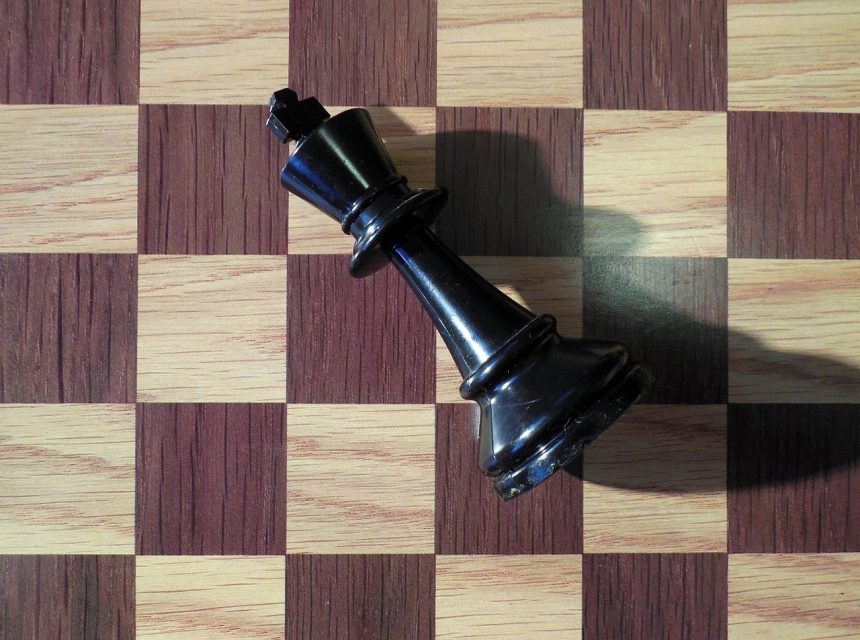One reason many people shy away from competition is that they dislike losing. With often only one winner, the sting of defeat can feel too humiliating. When people stop competing, they can become more fragile over time, to the point where even small setbacks can disrupt their well being.
Ironically, the best path to victory often involves losing repeatedly. After enough losses, you build resilience, learning to handle failure and keep moving forward. Every loss is a chance to learn from your mistakes, sharpening your skills and improving your odds of winning the next time.
If you’re someone who has lost, I commend you. A person who loses is still far ahead of the one who never tries at all.
Note: I wrote this post partly in response to some newsletter readers who were upset I wasn’t more upset about Harris losing. After all, I’m a minority who lives in deep-blue San Francisco. For as long as I can remember, I’ve tried to look at the positives of every situation. Perseverance is also a core value I’m trying to instill in my kids, especially since life won’t always be comfortable.
Let’s look at some case studies on how losing can eventually lead to winning. Nothing is permanent.
Losing to Win: The Presidential Election
With Trump’s victory, roughly half the country faces disappointment over Harris’s loss, while the other half celebrates. Women, in particular, have voiced frustration to me, largely due to concerns about potential threats to reproductive rights.
Despite a decisive defeat—even in the popular vote—there are key lessons here for Democrats as they look to shift momentum in the next election.
First, Democrats may recognize the importance of a robust primary election rather than selecting a candidate at the eleventh hour. A full primary process enables voters to feel more involved in choosing their candidate and to gain a deeper understanding of who they’re supporting.
Harris’s loss also underscores the need to connect more broadly with the American public. Democrats must expand their appeal, especially to working-class Americans who feel the daily pain of inflation the hardest. Avoiding candidates with a reputation for elitism, like California Governor Gavin Newsom, could be helpful. Although Newsom is a slick communicator, dining at the exclusive French Laundry during COVID restrictions damaged his standing with middle-class voters.
Additionally, the perception of insufficient attention to border security has been a sticking point. When Harris was asked on The View what she might have done differently, she couldn’t identify anything specific. There’s also the perception that DEI initiatives took priority over other concerns, while making a large swath of the population feel excluded. Democrats now have an opportunity to reflect on these election results and recalibrate for the future.
Those most disappointed by Harris’s loss may even feel inspired to take meaningful action: donating more, changing careers, or actively supporting their cause—moving beyond virtue signaling or harboring resentment toward those with opposing views.
The pendulum always swings.

Losing to Win: Finding Love in All the Wrong Places
Finding love is both serendipity and a numbers game. The more people you put yourself out there with, the better your odds of finding a life partner.
Years ago, I spoke to a 34-year-old man, whom I’ll call Biff. He was 6’4″, a bit overweight, jovial, and seemed unsure about his direction in life. Despite owning a townhouse and holding a stable job, he was unhappy.
When I asked why, he said, “I’m living the American dream, but I have no one to share it with. I can’t seem to find a girlfriend. I go to conferences hoping to meet someone, but nothing ever comes of it. I’m always in the friend zone.”
I then asked him how many women he had asked out in the past year. He admitted that he hadn’t asked out anyone. When I asked why, he shrugged, saying, “Maybe I’m just afraid of being rejected.”
“Welcome to the club!” I replied. “But that’s actually a strength we have as men. By asking, we grow stronger.” I encouraged Biff to approach at least 10 women for coffee or lunch at his next conference.
Seven women gave him the time of day, and one became his future wife.
Losing to Win: From Day Trading to Long-Term Investing
In my 20s, I was a day trader, riding high after one stock skyrocketed 50x in 2020. Emboldened, I even asked my managing director, Michele, if I could trade Worldcom options. She reluctantly agreed, but I sensed her unease.
18 months later, I wasn’t invited back for a third-year analyst position. I was too preoccupied with my own trades, losing sight of my role and alienating my senior colleagues at Goldman Sachs. Thankfully, I secured a position at Credit Suisse, where I continued to trade heavily, though with little success.
One year, the head of International flew in to question my habits. He gave me an ultimatum to stop trading or face termination. It was a wake-up call, and I realized I was hurting my career due to what had essentially become a trading addiction.
The 2008 financial crisis was another turning point, wiping out 35–40% of my net worth in just six months. Desperate to make sense of all the chaos, I launched Financial Samurai in 2009 as a type of personal therapy. It was then that I resolved to focus on long-term investing.
In 2011, I promised to leave the industry if I could recover my crisis-era losses. The fear of financial ruin forced me to reevaluate my life goals, similar to how someone might gain new clarity after surviving a near-fatal accident.
Since then, holding the S&P 500 rather than day trading has worked out well over the long haul. The experience taught me that sometimes losing is exactly what you need to find the right path. If there was no financial crisis, I probably would be much poorer and stressed today.
Losing to Win: When Others Force Their Desires on You
Here’s an interesting local example called Proposition K. Below is a map showing who voted “NO” (purple) to close a two-mile stretch of road along the beach on the west side, and who voted “YES” (green). Most residents on the west side, especially those in the northwest (deep purple), opposed the closure due to the inconvenience it would cause to their commute south.
However, residents on the east side, who wouldn’t be affected by the increased traffic, overwhelmingly voted “YES.” The west side Supervisor, Joel Engardio, placed the measure on a citywide ballot, knowing the majority would support the idea of a new park since they wouldn’t bear the impact.

As a result, residents on the west side are upset—not only about longer commutes but also about increased traffic and potential injuries in their neighborhoods as ~20,000 cars are rerouted through the Sunset district daily. Engardio’s political career is now at risk for going against the people he is supposed to represent.
What are the wins here? Oceanfront property owners may see a boost in property values. Some residents have a stronger case for working from home and getting their requests accepted. The west side of San Francisco may overall become more desirable given it already has the most amount of parks per square mile in the city.
Meanwhile, this vote demonstrates how certain issues can be strategically placed on a citywide ballot for a favorable outcome. I suspect roads like the Marina Boulevard and the Embarcadero could be put on the next citywide ballot to be shut down as revenge from west siders.
For those most enraged, this setback might fuel a drive to build significant wealth, allowing them to one day influence decisions in their favor. Without this loss, they might never have been motivated to pursue such great financial success. It feels bad when others impose their will on you. Nobody wants to feel helpless.
Being a Loser Might Be the Best Thing That Ever Happened
Imagine you’re part of a minority group that’s rarely represented and often overlooked. Losing is familiar, and with identity politics at play, getting ahead can feel nearly impossible.
Now, let’s say you’re part of the 60% majority, running against a candidate from a 7% minority group. Technically, you’d only need 12% of the majority vote to win against a minority candidate with full support from their group. The odds are in your favor—numbers and resources back you.
But here’s the twist: what if, even with these advantages, you still lose? Despite being the frontrunner, despite the support and resources, you come up short. Such a defeat can be crushing, especially when the expectation to win was so high.
On the other hand, for those used to losing, the sting of failure fades. And if you do manage to secure a victory, it feels monumental—a rare achievement against the odds. If you come from modest means, that victory is even sweeter, giving you a sense of resilience and a hunger for more.
This hypothetical isn’t just about elections; it applies across every type of competition:
- Competing with colleagues for a promotion
- Growing a business, website, YouTube channel, or podcast
- Securing a book deal and aiming for bestseller status
- Getting into college or a private organization
- Getting picked to be on a team
In any of these scenarios, overcoming the odds brings a sense of triumph that’s hard to replicate when the odds were already in your favor.
Fight On And Never Surrender
After coming to America as a high schooler, I’ve experienced my fair share of losses. From falling short in district tennis, to getting in trouble with the law the summer after high school, to facing college rejections, to ending my finance career after just 13 years, to family false starts, I’ve grown accustomed to losing.
Yet, all those setbacks have helped me develop a kind of short-term memory loss that keeps me going. Because of it, I’m able to keep competing and moving forward. The losses and rejections no longer sting as much as they did in my 20s and 30s.
Losing helps develop resilience, a vital trait if you want to eventually succeed. The next time you lose, reflect on the loss, and then carry on. Nothing will always go your way. Accept the fact and embrace the new challenge.
Tips For Overcoming Losses So That You May Succeed
- View Losses as Learning Opportunities: Instead of seeing losses as failures, treat them as feedback. Identify what went wrong, learn from it, and adapt your approach.
- Build Resilience through Repetition: The more you expose yourself to challenging situations, the less each loss will sting. Gradually, you’ll develop the mental toughness to handle setbacks.
- Separate Ego from Outcome: Avoid tying your self-worth to winning or losing. Stay confident in your abilities, regardless of the outcome, which will help you bounce back more easily.
- Celebrate Small Wins Along the Way: Recognize small improvements, even if they don’t lead to an immediate win. This will help you stay motivated and see progress.
- Surround Yourself with Growth-Oriented People: Spend time with people who encourage you to learn from mistakes and keep pushing forward. A positive, resilient network makes it easier to stay motivated.
- Practice Self-Compassion: Be kind to yourself after a loss. Instead of beating yourself up, remind yourself that everyone experiences setbacks. Compassion can make the journey to success far more sustainable.
- Set New Goals Immediately: After a loss, quickly refocus on the next objective. This will help you keep moving forward without dwelling on the setback.
- Embrace the Process, Not Just the Outcome: Winning is great, but the journey is often more valuable. When you enjoy the process of improving, the end result matters less, making losses easier to accept.
Readers, when have you faced a loss that helped you grow? How did you learn from it and come out stronger? Do you think people who avoid competition might be less resilient and take losses harder? What are some ways we can help people see the benefits of losing so they can eventually experience the joy of winning?
If you have over $250,000 in investable assets, schedule a free consultation with an Empower financial professional here. Complete your two video consultations before November 30, 2024, and you’ll receive a free $100 Visa gift card. There is no obligation to use their services after.
A year after leaving finance, I had two free consultations with an Empower financial professional that revealed a major blind spot. I had 52% of my portfolio sitting in cash, thinking I needed to invest like a conservative 65-year-old.
The financial professional reminded me that at 35, I still had many financial opportunities ahead. Within three months, I invested 80% of that cash and used the rest for a down payment on a fixer-upper—both decisions paid off well.
With a new president, it’s a good idea to get a financial checkup to see if you are properly positioned. Small adjustments today can mean significant financial differences in the future.
The statement is provided to you by Financial Samurai (“Promoter”) who has entered into a written referral agreement with Empower Advisory Group, LLC (“EAG”). Click here to learn more.
Listen and subscribe to The Financial Samurai podcast on Apple or Spotify. I interview experts in their respective fields and discuss some of the most interesting topics on this site. I appreciate your shares and reviews.
To expedite your journey to financial freedom, join over 60,000 others and subscribe to the free Financial Samurai newsletter. Financial Samurai is among the largest independently-owned personal finance websites, established in 2009.







